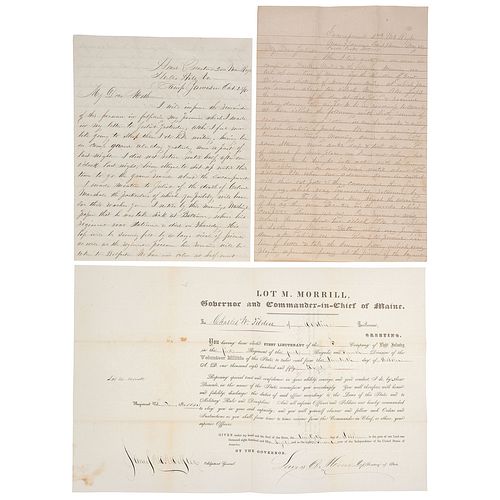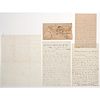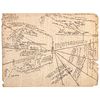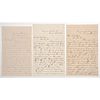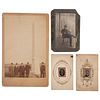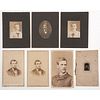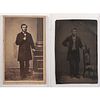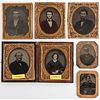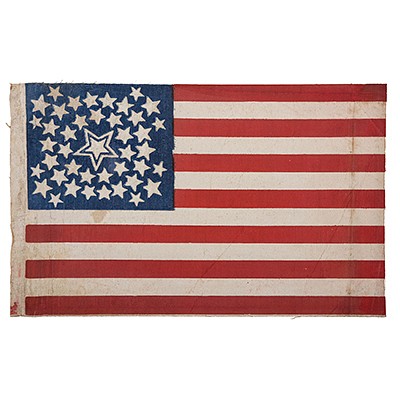Colonel Charles Tilden Civil War Archive, 2nd and 16th Maine Infantry, WIA Twice and Captured Twice at Gettysburg and Weldon Railroad
About Seller
6270 Este Ave.
Cincinnati , OH 45232
United States
With offices in Cincinnati, Cleveland and Denver, Cowan’s holds over 40 auctions each year, with annual sales exceeding $16M. We reach buyers around the globe, and take pride in our reputation for integrity, customer service and great results. A full-service house, Cowan’s Auctions specializes in Am...Read more
Two ways to bid:
- Leave a max absentee bid and the platform will bid on your behalf up to your maximum bid during the live auction.
- Bid live during the auction and your bids will be submitted real-time to the auctioneer.
Bid Increments
| Price | Bid Increment |
|---|---|
| $0 | $25 |
| $500 | $50 |
| $1,000 | $100 |
| $2,000 | $250 |
| $5,000 | $500 |
| $10,000 | $1,000 |
| $20,000 | $2,500 |
| $50,000 | $5,000 |
| $100,000 | $10,000 |
About Auction
Nov 19, 2020
Cowan’s Auctions, a Hindman Company, is pleased to present the November 19 Fall Auction, featuring over 400 lots of historically significant photography, manuscript material, artwork, and other ephemera dating from the 18th through the early 20th century, including the Civil War. Cowan's Auctions dawnie@cowans.com
- Lot Description
Archive of Charles William Tilden (1832-1914), 2nd and 16th Maine Infantry, consisting of 43 war-date letters to his wife Juliet, 3 letters to his sister Emma, and 2 letters to his mother. Also included are many war-date documents and letters to his parents from soldiers informing them of Tilden's captures - he was captured twice, first at Gettysburg (July 1863) and again at Weldon Railroad (August 1864). Also includes a letter by Captain S. Clifford Belcher written after Gettysburg and a hand drawn Gettysburg map. Charles William Tilden was a resident of Castine, Maine. A photograph of his home in Castine is included. He was 29 years old when he enlisted as a 1st Lieutenant in Co. B of the 2nd Maine Infantry. Tilden had previous military experience in the Maine Militia and included is his 1st Lieut. Commission in the 1st Regt. Volunteer Militia, dated Oct. 20, 1858. Because of this experience when the war broke out, Charles was one of the first to enter the service and was able to assume the position of 1st Lieut. in the 2nd Maine Infantry. His letters while in the 2nd, begin May 21, 1861 and conclude on June 28, 1862. Charles was discharged for promotion on June 23, 1862 and was then commissioned as Lieut. Col. in the 16th Maine Infantry, becoming full Colonel on Jan. 8, 1863. Just before the war ended, he would be breveted Brig. Gen. His letters in the 16th Maine Volunteers date from Sept. 21, 1862 to May 29th, 1865. There are a total of 25 letters. All letters except for one are to his wife, Juliet. Being Colonel of the Regt. meant that Charles was extremely busy. After his capture at Gettysburg and imprisonment in Libby, several of his men would write, keeping Mrs. Juliet Tilden informed about her husband.1. Commission from the Governor to Charles electing him 1st Lieut. in the 1st Volunteer Militia of Maine, Oct. 20, 1858. LETTERS WHILE IN THE 2ND MAINE INFANTRY (Most letters are four pages in length.)2. Letter from Charles at Willets Point, Long Island, May 21, 1861. “The hardest of all was when Charly came down Sunday morning in his night clothes & the first greeting with tears in the little fellow’s eyes, was ‘Papa, I don’t want you to go to war.’”3. Letter from Charles to his sister Emma, Head Quarters 2nd Regt. V.M.M., Fort Corcoran, Sept. 30, 1861. “Since I last wrote you, Emma, I have passed through more than I ever experienced in my life & yet I am spared while others have been cut down about me. My own life was in the same danger as those about me at the unfortunate battle of Bull Run; but God in his mercy saw fit to protect me,…I hope & trust we may not again be placed in such a perilous situation & I think we shall not, having since one at the head of our army at this time in whom we can place implicit confidence…”4. Document, Oct. 5, 1861, listing the names of 14 members of Tilden’s Co. who needed an advance on their pay. The money was given to their mother or father as signed on the document.Letters 5-16 are headed “Head Quarters, 2nd Maine Regt., Hales Hill, Va., Camp Jamesen” and date from October 26, 1861-February 9, 1862. Much detail about camp life and the men of the 2nd Maine Volunteers are given. A few notable excerpts:Oct. 26, 1861. “I am now writing in my tent all alone; being sole proprietor of the little cloth house which is about ten feet square.”Jan. 1, 1862. “The Staff & Company Officers of our regiment here were all invited over to the eighty-third Pennsylvania Regiment to participate with the officers of the third Brigade in celebrating New Year’s Eve.” Tilden then goes on with a long description of the gala event.Jan. 15, 1862. “Our Regt. are to have new rifles…but I am not disposed to say much about them, until we get them for fear they may be of the same kind that were sent to us before & were returned, being the old flintlock musket altered over.”Jan. 23, 1862. “There have been three deaths in the Regt. the past week…These cases make 5 deaths from sickness since leaving Bangor.” He includes an interesting observation about women serving with the regiment: “We have two women in the Regt. who have been acting as nurses, but are now acting as laundresses for the Regt., the government not recognizing female nurses.”Feb. 5, 1862. Out on picket duty, the Sentinels called to Tilden saying that they heard enemy Cavalry: “Now I suppose your curiosity is somewhat excited to know the cause of this alarm. There are quite a number of cattle in the woods outside of the lines which are a little wild. They were probably startled in the stillness of the night by some noise and came rushing out across our lines. Some of them had shoes on which had become loose, the rattling of which resembled the Cavalry Sabres dangling when making a charge.”17. Letter from Charles - headed Alexandria, Va., April 19th, 1862. “Here we are, Juliet, in this forsaken city waiting transportation to our different Regiments…Monday we left Augusta with a detachment of recruits of some one hundred & twenty six in number…” In New York Tilden “marched our men down Broadway…and took the steamer at the foot of Battery Place.” They then proceeded to Camden, Philadelphia, Baltimore, and finally “we had orders to report ourselves here at this miserable place...We are now stopping at the Marshall House where Col. Ellsworth was shot & I must say that it is about the meanest house I ever was at, far inferior to our country hotels.”18. Letter from Charles - Camp Winfield Scott, Near Yorktown, Va., April 27, 1862. “Our Army occupies the ground that Genl. Lincoln’s troops held at the Siege of Yorktown in 1781 & Genl. McClellan’s Head Quarters are at the same place that Genl. Knox occupied during the siege & according to present appearances, it will be about similar affair, only in a much more extensive scale...Genl. McClellan is still at work having large guns & mortar brought forward and placed in position. Night before last a large fatigue party was sent out just at night & commenced digging a trench outside of our pickets & right in front of the enemy & before morning we had a trench between two & three miles long, up & down our lines. I think the Secesh must have been a little surprised to wake up in the morning & find such a work right in front of them, all done in the darkness of the night.”19. Letter from Charles - Camp Winfield Scott, Near Yorktown, Va., May 4, 1862. “…this is a gala day with us & all is bustle & excitement in camp, owing to the evacuation of Yorktown…We were making preparations to open our large guns on the enemy tomorrow morning as everything had been put in readiness. Heavy guns & mortars all placed behind entrenchments, but at three o’clock this morning, Genl. Franklin’s Division which has been on board of transport for the past two weeks were brought in rear of the Rebel force on Gloucester Point, capturing the whole of Genl. Longstreet’s Division consisting of some 9,000 troops. Upon this the whole Rebel force left Yorktown in haste, leaving some fifty large guns, their magazines full of ammunition & large quantities of provisions…Aside from this our gun boats steamed up York River this morning in line of Battle & are now at Yorktown. What they have taken in the shape of Navigation, I have not learned…Our troops are constantly coming in loaded down with trophies taken from the Rebel works, & now while I am writing there is a whole brigade marching past, their bands playing Dixie & bound for Yorktown…We are all packed up & expect to be ordered into line every moment. One thing is certain, there is glory enough for one day & what is better than everything else is the small loss of life among such a large Army, being placed as we have been right under the enemies’ guns. I presume that the cry among many of our folks at home will be that Genl. McClellan has let the enemy slip through his fingers. To such persons let me point the finger of scorn. We all consider it a great victory & can be well said that Genl. McClellan drove the enemy from their strong hold at Yorktown with the shovel & pick.”20. Letter from Charles - Station 17 Miles from Richmond, Va., May 21, 1862. “We arrived at the White House about three o’clock p.m., pitched our tents & made ourselves as comfortable as circumstances would allow. Here we found the Federal fleet again, consisting of three gun boats and a large fleet of transports. How they got up through this crooked river is more than I can tell….This place contains some seven thousand acres of fine tillage & timber land, much of it is now under cultivation, large wheat & corn fields are seen as far as the eye extends. The Plantation is owned by Col. Wm. H. Lee who is now in the Secesh Army & whose wife’s family left the premises but a few days since. This is the place where Genl. Washington courted & married & you can see what hands the property has fallen into. They were obliged to leave in such haste that they could not take their slaves with them. A short distance from the house are the Negro Huts which present quite a Negro Village. They seem to be happy indeed that their Mistress was obliged to leave them.”21. THE BATTLE OF HANOVER COURT HOUSE. Letter from Charles - Encampment 2nd ME. Regt. May 28, 1862. “We were turned out Tuesday morning amid a drenching rainstorm, mud ankle deep, and took up our line of march…The enemy had very much the advantage of us as they were secreted in the woods which completely surrounded us. Our Regiment was ordered forward about two o’clock p.m. to support a section of Martin’s Battery which was promptly done, after which we were ordered to proceed in line of battle & take the enemies’ battery (which was playing upon our forces) at the point of the bayonet. As we were proceeding on our mission through an open grain field, the caisson of the enemies’ battery blew up & they retired...We had not proceeded far before we discovered that the enemy were in pursuit & endeavoring to surround us & cut off our retreat. We were immediately ordered into line of battle, threw out our skirmishes and sure enough they were coming upon us in full force through the woods. A large Regt. came out in front of us. At the same time they, sending a large force down either side of us through the woods, forming a half moon. The 44th New York took position on our left & engaged the right of the enemy in the woods, our little band of some three hundred only engaged their center with the aid of two pieces of the Massachusetts fifth Battery. While we were fighting the center, which we succeeded in driving back to the woods, we were attacked by the large forces in the woods on our right, making a crossfire upon us...Here we found something formidable; a very large force protected in the woods & by a close fence along the road. So near were they that their guns could be seen sticking through the fence. I will not pretend to say what force the enemy had in these woods, other than that it was very much larger than ours. Our Regt. was in action at this position something over one hour & succeeded in silencing the enemy, & nearly just as the 14th N. York Regt. relieved us. It was fortunate that this Regt. came up just as it did as our boys were just about out of ammunition. Suffice it to say, we drove the enemy from the woods & according to accounts, they are now some five miles from us. Their loss was heavy, having a large number killed & wounded, pretty much all of them falling into our hands. Our force have taken up to this time some eleven hundred prisoners, a large portion of which are North Carolina troops who came in & gave themselves up. But it is now my painful duty to record the casualties in Company B.” Tilden then lists all the casualties and then says, “I was slightly wounded in my neck, a ball just grazing my Adam’s Apple, rather a narrow chance. W. B. Haskell, very slight wound in the hand. The whole loss of the Regt. was 33 killed & wounded. Company B suffered more than any other company in the Regt. Our loss being seven out of the thirty-three.”22. THE BATTLE OF GAINES’ MILL. Letter from Charles - In Camp Across the Chickahominy, June 28, 1862. With this letter is a full-design patriotic envelope “The Loyal Union - Maine.” Tilden writes: “It is my pleasure through the blessing of Divine Providence that I am permitted to inform you that after the hardest battle we have yet had, that I have escaped uninjured, while many of our Army undoubtedly have fallen & have been taken prisoners…there are some eleven of my members missing which may come in before night. Lieut. Brown was wounded in the leg below the knee & am in hopes it is not of a serious character, altho I am unable to say as he, with his brother Wesley who stopped at the Hospital to take care of him, must have been taken prisoners at the time the enemy broke through our lines…Capt. Tibbetts must have been taken prisoner as he was at the Hospital at the time they were taken. This is John Tibbetts of So. Danver, not R. Tibbetts of Castine. I hardly know what to think of this battle, but it is being evident that we have been defeated after a day & a half of hard fighting. The Enemy crossed in very strong force on the right of our lines & caused a retreat which was made in good order at about ten o’clock. What force we had was placed in position. We were then attacked on our right, center & left as I before said with a much superior force & who we held at bay until about seven (7) o’clock p.m. At this time our left broke, causing a panic. We were rallied however & held our ground. Orders came however in the night to retire across the river which was done under cover of the night. We are now in the open field across the river.”LETTERS WHILE IN THE 16TH MAINE INFANTRY. A total of 23 letters; letters #23-37 reveal that Charles is getting used to his leadership role. As Lt. Colonel he is much better trained than the Colonel, and the Colonel eventually resigns leaving Tilden as Colonel. Four of the letters are written on imprinted “Head Quarters, Sixteenth Regt. ME. Vols.” stationery. Notable examples:Ridgeville, Md., Sept. 15, 1862. “…here we are at Ridgeville, some thirty-six miles from Washington, having been left here to guard the town with no shelter for our men & our ranks…My situation is anything but a pleasant one, having a Colonel who is entirely unacquainted with military, as also most of the line officers. The men, too, are as verdant as one might desire & you can well imagine my situation.”Head Quarters, Sixteenth Regt. Me. Vols., Camp Nothing Near Sharpsburg, Md. Sept. 22nd, 1862. “On passing through the city we were surprised to see the Union feeling manifested by the citizens there. At our approach the Stars & Stripes were displayed all along the roads. Ladies waving their handkerchiefs, etc...It really had the appearance of a Northern City. One cause I presume of there being such a display was their being relieved of the Rebel soldiering who had possession of the city a few days previous...We started marching over the late battlefield which was perfectly horrid, the Rebel dead being left on the field…”Near Sharpsburg, Md. Oct. 19, 1862. “I cannot but help think of the contrast between my situation here in camp and what it would be were I at home. Here I am sitting down to my camp table made out of two bread boxes, nailed together with the doors of my tent thrown back to feel the heat of the log fire which I have in front of the tent, penning to you my thoughts as they occur to my mind, & which I am frank to say are not very bright.”Camp Near Purcellville, Va. November 2, 1862. “You will see that our position is somewhat changed since I wrote you last. We are now back in Virginia & are still under orders to march farther on...Last Sunday morning we broke camp and started about 1:00 p.m. amid a drenching rain storm. Marched some five or six miles that afternoon, remained in the woods all night without any covering, raining all night. The only way we could keep comfortable was to build fires and get around them in squads of twenty to thirty men…Thursday we crossed the Potomac into Virginia on a pontoon bridge & encamped near Levetesville.”Head Qrs. 16th Maine Vols. Camp Near Brooks Station, Va., December 4, 1862. “I am happy to state that the men have had the clothing issued to them…Although my duties have been somewhat severe, I can now say that I am truly gratified with the result & the marked difference in the appearance of the Regiment both in outside looks & their improvement in drill. Since the knapsacks were received, I have established Company & Battalion Drill daily both for officers & men & even in this short span of time have been complimented by those higher in command for the good appearance of both men & camp…Now for the Thanksgiving dinner in camp which consisted of roast beef, hard bread & rice pudding. The beef was cork baked in a small Dutch oven, which we took from a Rebel camp while at Rappahannock Station & which we find a very convenient affair in the kitchen department.”38. THE BATTLE OF FREDERICKSBURG - On the Battlefield, Don't know the Name of the Place, Near Fredericksburg, Va., Dec. 14, 1862. Tilden addresses his wife: "My Dear Juliet I have only time to say that again have I been into a hard battle & come out unharmed. Our Castine boys as far as I can learn are all right. Our Regiment lead the charge yesterday & behaved splendidly. I never saw men behave better. They have now a name which will do credit to the old Pine tree state, got at a great sacrifice as you will see by the report. I took the Regt. into action with 417 men, and all I can now muster is about 170. Our loss is 247 killed, wounded & missing. One Capt. killed, one Lieut. killed, two Captains wounded, 6 Lieutenants wounded. Have not time to write more now. God grant that I may be protected in all future actions. Love to all. Your Aff. Husband C. W. Tilden”39. Camp Belle Plains, Va. January 18, 1863. “Our thinned ranks go to show what we have passed through, numbering about three hundred for duty. I trust that we may not have to pass through such severe trials again, altho we cannot tell what may be in store for us...The Major & myself have quite a comfortable tent… We dug out a cellar some twelve feet square & five feet deep, logged the sides & we end up solid, having the logs sided, placed the tent on top of these logs, giving us good room & a chance to stand up straight. The heating apparatus consists of a fire place dug into the end which is not logs up extending into a hole dug in the ground outside of the tent with a bowl over it which answers for a chimney. We find it very comfortable when wind does not blow very hard, in which case it smokes somewhat badly, making it rather uncomfortable for the eyes.”40. Camp Near W. Oak Church, May 28, 1863. “During my ride, I met with one of the Virginia ladies out on horseback. I merely passed the time of day with her ladyship & rode on. Had she been pretty good looking, perhaps I might have offered my services & formed her acquaintance. It is really a beautiful country in front of our lines, some beautiful farms & plantations, left in charge perhaps of a few Negroes & in some cases, the families of the Officers in the Rebel Army are left behind to take charge of the property.” 41. CAPTURE AT GETTYSBURG. During June 1863 Col. Tilden apparently had little time to write. The Gettysburg Campaign had started and the next letter dated July 11th, 1863 was from Capt. S. Clifford Belcher who fought beside Tilden at the battle of Gettysburg. Both men were captured. Here is Belcher’s letter to Tilden’s wife, Juliet: Baltimore, Md. July 11, 1863. "Madam: Thinking that it is possible you may not now hear directly in regard to the fate of your husband in this last battle, I take the liberty to write to you & assure you of his safety. Col. Tilden, together with the whole 16th Me. Regt. (except those previously killed or wounded) was taken prisoner on the 1st of July. We were immediately taken to the rear of the enemy's lines where we remained till the morning of the 4th. On the morning of the 4th the enemy began to fall back, and we were marched towards Hagerstown. The next day, the 5th, we continued our march passing through the South Mountains near Monterey & Waynesboro. It was dark before we got through the mountains, & I availed myself of the darkness to elude the guard & escape. I lay concealed three days in the mountains until the Confederate force had all passed & then proceeded hither. I am glad to assure you that Col. Tilden escaped unharmed in the battle tho his horse was shot under him. He was in good health & spirits when I last saw him on the 5th instant & was enduring his captivity with as much philosophy as could be expected in a man who likes fighting as well as he. I think he had some idea of attempting to make his escape, & perhaps he did so & you have word directly from him. If so I congratulate both you & him. I have only to add that the Union prisoners so long as I was in the Rebel lines were courteously & kindly treated, & you need have no solicitude in regards to his treatment which your husband may receive if still a prisoner. I am, Madam, Very Respectfully Your Obt. Servt. S.Clifford Belcher Capt. Co. G. 16th Regt. Me. Vols. To: Mrs. Chas. W. Tilden Castine Me. If you should wish for any further information, a letter directed to Washington would probably find more."42. Following the battle of Gettysburg the men of the 16th that appreciated their band took up a collection to replace one of the instruments that was apparently damaged: “Camp of 16th ME. Vols. in the field Maryland, July 7th, 1863...We the undersigned officers and privates of the 16th ME. Vols. agree to pay the several sums set against our names towards buying an Eb. bass tuba similar to the one now in the band, the money to be paid to the Adjutant on next payday." With 21 signatures of men in the 16th and the amount they are pledging varying from $1 - $7.43. Letter from Sergt. C. W. Ross, Co. F, 16th ME. Vols. writing to Mrs. Tilden. Ross was captured with Charles. U. S. A. General Hospital, Annapolis, MD. Aug. 22, 1863. "Mrs. Chas. W. Tilden, I was confined in the Libby Prison, Richmond, and occupied a cot in the prison Hospital. Sick. I was taken the same time as the Col. at Gettysburg and in a conversation I had with him, he wished me to inform you that he was in the best of health and spirits and expected to be paroled very soon. Our means of communication was not very extensive consisting of the key hole of a lock in a door separating the Hospital from the officers' prison and done by stealth. The officers are not allowed any communication or to write, the sick and wounded only were paroled this time. The Col. has plenty to eat and is as ready again to lead us on as we are to follow our Gallant Commander and again give the Rebels cause to remember the 16th ME. Vols. Yours Respectfully Sergt. C. W. Ross Co. F. 16th ME. Vols."44. GETTYSBURG MAP A detailed hand-drawn map of the battle of Gettysburg. Because of the detail it was probably made several months after the battle when all the facts were known.45. A 37-page typed speech given at the death of Charles Tilden entitled, “Two Thrilling Escapes from Confederate Prisons”. This speech gives valuable information about Tilden’s role in the battle of Gettysburg, his escape through the tunnel at Libby Prison, and his escape after being captured at Weldon Railroad by jumping from the train.46. A printed photograph of Libby Prison, poor condition probably printed during the turn of the century.47. BATTLE OF SPOTSYLVANIA COURT HOUSE. Letter from Charles to Juliet, Head Qrs. 16th ME. Vols. On the Battlefield Near Spotsylvania C. H. Va., May 18, 1864. “Since my last communication we have been under fire some part of the time, yet not brought directly in to action. Today we have been under a very heavy artillery fire but have not suffered any in the Regiment. How much longer this battle will last I am unable to state or give any idea. The enemy seemed determined to contest every inch of ground & fight with desperation. Yet I feel confident that success will attend our efforts. All seem to have full confidence in Genl. Grant's ability to plan the campaign. Our loss has been exceedingly heavy in the Regt. thus far, both in Officers & men, heavier than any Regiment in the Brigade...We are now in the First Brigade, 2nd Div., 5th Corps. Letters directed to me at Washington D. C. naming the Regt. reach me all right.”48. Letter written to Mrs. Tilden from the Chaplain of the 16th Maine U. Balkam, South of Pamunkey River Near Hanover Town, May 31, 1864. “Dear Mrs. Tilden I dined with your husband today at the extreme front where he is always to be found. He is now posted within 13 miles of Richmond & within 5 or 6 of its outer defenses. He is well, battling a slight cold. He was very much fatigued by the rapid marching of Friday & Saturday & was somewhat unwell but is quick recovered now. I greatly rejoice with you that in all their perils, he has thus far escaped without the slightest injury. May he be protected to the end. Yours truly, U. Balkam Chap. 16th ME.”49. Letter from Sgt. C. H. Parlin of the 16th Maine writing on behalf of Charles to Mrs. Tilden, South of Pamunkey River Near Salem Church 14 Miles from Richmond Tuesday, May 31st, 1864. “You can imagine your special Army Correspondent sitting on a stump under a big pine tree "plying his avocation." The Col. is tough & hearty and has stood the campaign thus far remarkably well. The Regt. now numbers 273 men. Everything goes well with the Army of the Potomac, and we expect to celebrate the 4th in Richmond...Yesterday part of Ewell's Corps made a force attack on the 1st Div. of our Corps, but were driven back with great slaughter. Our loss was very small as the boys were behind good breastworks.”50. Near Bottom’s Bridge, Va. June 12, 1864. “Never in all my campaigning have I witnessed 7 experienced such suffering & hard fighting as there has been during the past month. Both sides seem determined, one to beat & the other sent to be beaten & where such a desperation exists between two contending Armies… it may be the intention of Genl. Grant to lay siege to Richmond. Of this none of us know but time will reveal his plans.”51. CAPTURE AT BATTLE OF GLOBE TAVERN. (SECOND BATTLE AT WELDON RAILROAD). Letter by Quarter Master Sergt. of the 16th ME. Vols. George W. Brown to Mrs. Tilden, August 20th, 1864. “I am sorry to have to inform you that day before yesterday our Regiment, as well as the Brigade, got under a very heavy fire, and by some mismanagement they were all taken prisoner, the Col. and Adjt., also Lieut. Davis, Capt. Lord, and all the other Officers of the Regiment, but Lieut. L. K. Plummer of So. Jefferson and Lieut. Lothrop, together with some one hundred of the men...We regret the loss of our dear Colonel much, and hope that he may yet escape, and if not that he may be used with decency and be allowed ere long to return to his command once again. The object of the fight as I understand it was to capture the Weldon Railroad. I believe we took it and hold it. I have taken the liberty of addressing you to relieve your anxiety.”52. TILDEN ESCAPES. Letter by Quarter Master Sgt. George W. Brown to Mrs. Tilden, August 23rd, 1864. “Allow me to congratulate you upon the safe return of your dear husband, as well as our dear Colonel, and I can assure you it was a happy meeting to both Officers and men when upon the evening of the 22nd at about 3 o'clock the name of Col. T. was sounded along the line. The boys all arose from their slumber to meet him. Little did we expect to see him so soon, although we candidly believe that he would make his escape if possible...He was carried across the Appomattox River and when within fifty yards of the cars that were ready to convey them to Richmond, the Colonel, together with Lieut. E. F. Davis, dropped out by the way and laid until late in the evening when they recrossed the River, following the Railroad down until they came to the place where they were captured. They then crept up to the line of battle and found them asleep and crossed, and they then came to the picket line and found the picket asleep and came into our line on the morning of the 22nd.”53. Letter from Congressman W. H. Waldron, Lewiston, Maine, August 26th, [1864] to Col. Tilden. A long letter complementing much about the 16th Maine and the Colonel’s bravery. He would like to see Tilden receive his star as Brigadier General.54. Written medical certificate from the Surgeon of the 16th, William W. Eaton. September 22, 1864. Asking for a leave of absence for Col. Tilden after “long confinement in the Rebel prisons at Richmond and aggravated by the severe hardships and exposure to wet and cold… upon his second capture and escape in August last.”55. Printed certificate of disability granting Tilden a leave for 20 days.56. Letter by Lt. Col. A. B. Farnham praising Tilden and wishing him a speedy recovery. “I have been over a part of the battle field of the 18th & 19th with Capt. Plummer and from his account of the fight, I hardly see how so many men came out of it. The only wonder to me is that you were not all taken by the enemy...I found both of my horses had left for the happy hunting grounds where there are no more hard drives for them, sore back or short feed...I have to thank you for the kind offer of the use of your horses & will look after them and try to keep them in good condition for you.”57. Letter from Witherlee & Co. Bangor, Maine. The “Friends of Colonel Tilden are very glad to be able to obtain the sword for so worthy an Officer. $76 dollars has been received.”58. Letter from Charles to Juliet, Camp in the field, February 11th, 1865. “You are probably aware of this of the cause of the unusual delay in receiving your regular weekly communication from me, having seen accounts of the late movement of the 5th Corps & the report of my being wounded, which fortunately was nothing serious, resulting in nothing more than a pretty severe bruise in my right thigh. At first I thought the ball had penetrated the flesh & lodged in the fleshy part of my leg, but on arriving at the Hospital and finding it was no worse, I immediately mounted my horse, (which I left at the rear & which Jack had brought to me at the Hospital) & started for the front again, although my wound was quite painful & made me so lame I found it exceedingly difficult to ride & rather slow getting about on foot…the order was suddenly changed to an advance on the enemy… this was pretty hard, men suffering from cold, wet through to the skin, guns many of them in bad condition, & I myself feeling pretty sore. Yet I flattered myself as long as I had my horse, I could get along quite well. Our lines were formed & my Regt. was in the first line of battle. We had advanced but a short distance, when the enemy opened upon us & my horse was shot under me almost at the first fire. There was only one alternative for me at this time, this was to try it on foot...I was again struck by a spent ball on Tuesday p.m. but received no injury from it, the ball passing through a small pine bush about two inches through which I was near, stopped its force before striking me...My Regt. as usual had suffered pretty severely, having had five killed, fifty-eight wounded and nine missing, out of two hundred & twenty-one that I took into the fight...we have suffered more from exposure, the cold & wet weather, than any engagement that have ever been in. The men were ordered to leave their knapsacks & shelters in camp, taking with them their rubber & woolen blankets.”59. Letter from Charles to Juliet Camp in the field, February 21st, 1865. “First of all I presume I must refer to my wounded, my name having been published somewhat freely in the papers as being wounded...When the ball struck me, I thought to myself that I was called for & might be a subject for some h
- Shipping Info
-
Buyers are required to pay for all packing, shipping and insurance charges. Overseas duty charges are the responsibility of the successful Bidder. Be aware that for larger and/or valuable items, shipping charges can be substantial. - If there is no shipping amount on listed your invoice, you will need to make arrangements to pick up or ship your purchase through an alternative shipping company. Our shipping department can be contacted at 513.871.1670 (ext. 219) or email shipping@cowans.com. - Shipping charges include insurance for your order while in transit. If you have private insurance we will adjust your charge to include only packing and shipping. - Please allow 14 – 21 days after payment to package and ship your purchase as carefully as possible.
-
- Buyer's Premium



 EUR
EUR CAD
CAD AUD
AUD GBP
GBP MXN
MXN HKD
HKD CNY
CNY MYR
MYR SEK
SEK SGD
SGD CHF
CHF THB
THB